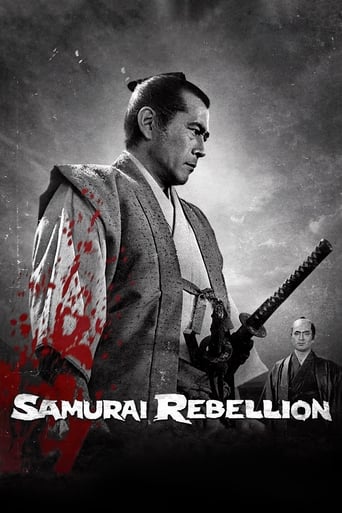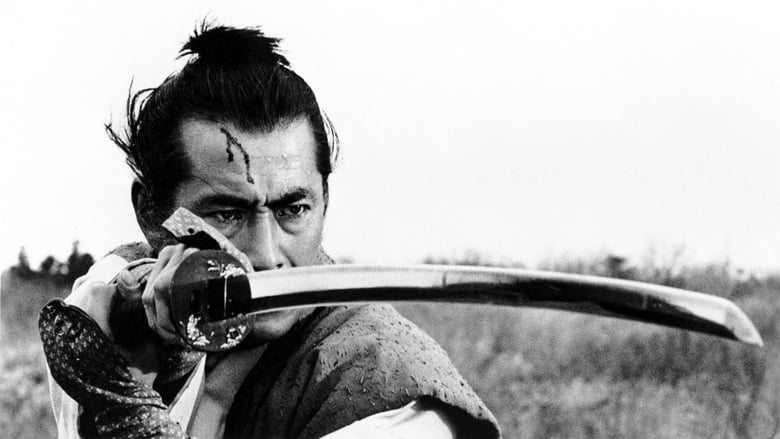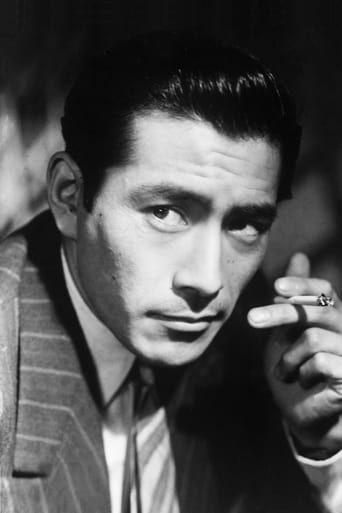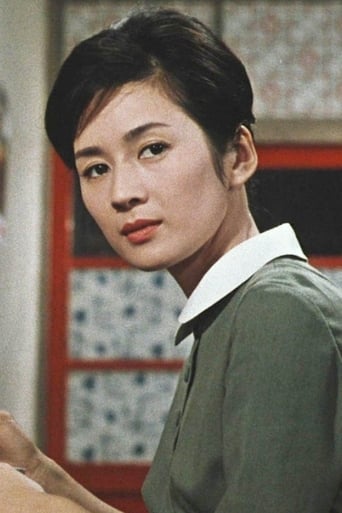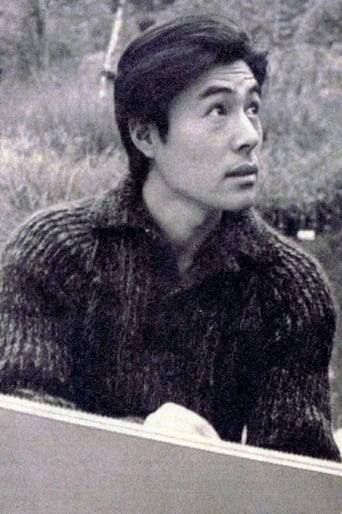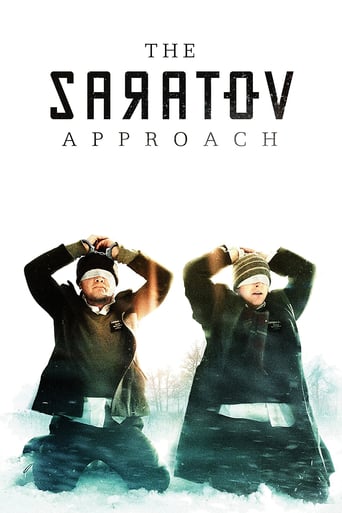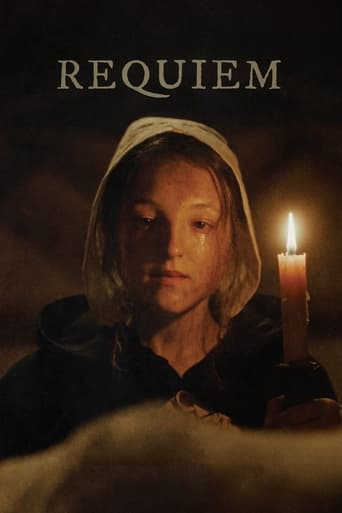Samurai Rebellion (1967)
The mother of a feudal lord's only heir is kidnapped away from her husband by the lord. The husband and his samurai father must decide whether to accept the unjust decision, or risk death to get her back.
Watch Trailer
Free Trial Channels
Cast


Similar titles
Reviews
This movie was so-so. It had it's moments, but wasn't the greatest.
The plot isn't so bad, but the pace of storytelling is too slow which makes people bored. Certain moments are so obvious and unnecessary for the main plot. I would've fast-forwarded those moments if it was an online streaming. The ending looks like implying a sequel, not sure if this movie will get one
While it doesn't offer any answers, it both thrills and makes you think.
The plot isn't so bad, but the pace of storytelling is too slow which makes people bored. Certain moments are so obvious and unnecessary for the main plot. I would've fast-forwarded those moments if it was an online streaming. The ending looks like implying a sequel, not sure if this movie will get one
I don't know anything about cinema. I haven't studied the director's work, or the actors or the detailed history or culture of Japan. I do know that I liked this movie. It is a story of power, the abuses thereof and the conviction it takes to stand against the use of power to dictate any human being's fate. Lady Ichi's past is the crux of the story's conflict. The Sasahara family is divided on how and what decisions should be made pitting brother against brother and husband against wife. Yogoro and Ichi's deep love for one another reignites Isaburo's spirit and fuels the fire of rebellion within them. Not world changing, all out rebellion. Rebellion in the form of their refusal to accept that a person can be treated as a commodity.
Many people familiar with Japanese culture know how important it is to respect your elders and superiors. Thus, it's not surprising how Sasahara lived most of his live. The impressive part of this movie is that it goes beyond those traditional Japanese values and shows that respect for family and the ones you love should be considered more important than the respect demanded by those outside of your family. While this type of behavior may not have been typical, this is what makes it such a compelling story. It should be noted that the chamberlain commented on Sasahara's change in behavior and even showed respect for it. The movie contained good action scenes but was actually dominated by dialog... and still riveting.
"During the powerful Tokugano Regime in Edo (presently Tokyo), there were 264 lords or "daimyo". These feudal lords ruled their clan and the people under them". In 1725, the henpecked samurai Isaburo Sasahara (Toshirô Mifune) and his friend Tatewaki Asano (Tatsuya Nakadai) are the best swordsmen of their clan. Isaburo regrets his arranged marriage with the dominator Suga (Michiko Otsuka) and expects to give a good marriage to his son Yogoro (Go Kato). However, their Lord Masakata Matsudaira (Tatsuo Matsumura) orders Yogoro to marry his mistress Ichi (Yôko Tsukasa), who has a bad fame in the clan since she slapped the lord's face and torn his clothes apart. The Sasahara family objects but Yogoro accepts to marry Ichi for the good of his family. Instead of a pampered woman, Ichi proves to be a good wife and discloses the reason of her reaction to Yogoro, when she surprised him with a mistress after bearing their son. Ichi delivers the baby girl Tomi and is loved by Yogoro. When the lord's son dies, he orders Ichi to return to the castle to legitimate their son and successor of his clan. Yogoro does not accept the order under the protest of his family, and his brother Bunzo (Tatsuyoshi Ehara) lures and kidnaps Ichi, bringing her back to the castle. Isaburo and Yogoro decide to request the return of Ichi and have to face the wraith of their lord and clan. "Samurai Rebellion" is another Japanese masterpiece, with a beautiful and engaging romance in the period of Tokugano Regime in Edo and comparable to Romeo and Juliette. Further, this is also a cruel story of attitude against tyrannical governments and I loved the line "We All Have Our Own Way of Living". I am fascinated by the rich Japanese history, despite my knowledge be limited to the movies I see, and I found "Samurai Rebellion" wonderful also in this regard. The direction and acting are awesome, and the stunning Toshirô Mifune has another fantastic performance. The black and white cinematography associated to the magnificent camera work, settings and scenarios gives an intense reconstitution of Japan lifestyle in the Eighteenth Century. My vote is ten.Title (Brazil): Not Available
Isaburo Sasahara is a former samurai warrior and master swordsman who now lives a quiet life as head of his family, he has been continually henpecked by his wife for all their married life, so its his ambition to have his eldest son Yogoro married to a woman who will respect him. Isaburo's plan is thrown into disarray however, when he receives a notification from the Lord of the Aizu clan, that he would like Yogoro to marry Lady Ichi, a mistress of his who has fallen out of favour. This in itself seems rather insulting to Isaburo, as Lady Ichi he learns has a reputation of being violent towards his lordship and added to that she has an illegitimate child by him. After much family discussion they all agree that to refuse his lordship's offer would mean certain ruin for the Sasahara family, so they agree. Much to their surprise Lady Ichi is a kind, affectionate, helpful and thoroughly pleasant woman. She regales them with tales of his lordships cruelty and adulteress behaviour, the family are pleased she has finally found happiness with Yogoro.Yogoro and Ichi are blessed with a child, that helps Ichi forget she had to give up her first child, as it was second in line to his lordships domain. However after the heir dies, Yogoro now head of the family receives another request, that Ichi should return again, as her son is now heir and it wouldn't be fitting for the mother of an heir not to be with her child.This however is the final straw and Isaburo and Yogoro set out to defy their lord and fight for their rights.Samurai Rebellion was Masaki Kobayashi's first foray into the field of independent films and he returned to a familiar theme (previously used in Harakiri,1962) of injustice perpetrated by a tyrannical authority figure. Kobayashi teamed up with legendary Toho studios and Mifune Productions to recreate the literary vision of Yasuhiko Takiguchi's "Hairyo tsuma shiatsu" in a script by Shinobu Hashimoto. The films original title literally translated as Rebellion: Receive the Wife was changed for western audiences at the request of Toho, as they didn't believe it sounded manly enough for a Western audience that were very keen on Samurai films. Despite its more familiar title, this is very much a family drama, that wonderfully builds up its characters and to label it as a Samurai or action film would be erroneous, the rebellion scenes occurring only as we near the finale. Kobayashi's also uses Japanese architecture and symmetry to further the mood, using pillars, castle walls, doors, protective eaves and endless straight lines to promote stability, when the Sasahara family are having a less than unified debate on their predicament, the members are all stationed at unusual differing distances from the camera making the harmonious composition appear unsymmetrical when a member leaves the room and also towards the end of the film Isaburo and Yogoro remove all elements of geometric stability from their home as they await the arrival of their feudal lords men, their act seemingly to once and for all end their association with their restraining dogmatic social structures.The performances are all superb, Mifune giving us one of his more retrained performances with only glimpses of his more familiar gusto as he emotes and reflects on the tragedy of the situation his family is in. The great Tatsuya Nadakai is restricted to a few brief scenes, but his power still shines through. Yôko Tsukasa and Go Kato also produce memorable performances as the loving couple willing to die to retain their partnership. Samurai Rebellion is a powerful film that reflects its directors concerns with the abuse of authority, it exudes class and visual style and its attention to detail is second to none. As a film it can't be faulted.

